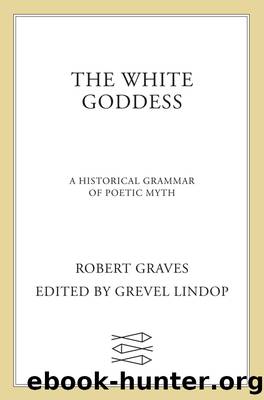The White Goddess (FSG Classics) by Robert Graves

Author:Robert Graves [Graves, Robert]
Language: eng
Format: azw3, mobi, epub
Publisher: Farrar, Straus and Giroux
Published: 2020-08-03T16:00:00+00:00
Moon
–
Division of Waters
Mars
–
Dry Land, Pasture and Trees
Mercury
–
Heavenly Bodies and the Seasons
Jupiter
–
Sea-beasts and Birds
Venus
–
Land-beasts, Man and Woman
Saturn
–
Repose.
The apparent illogic of the creation of Light, and even of Pasture and Trees, before that of the Heavenly Bodies and Seasons – though here it has been ingeniously suggested by Mr. Ernst Schiff that the Heavenly Bodies were not visible until the fourth day because of the ‘damp haze’ mentioned in verse 9 of the Creation story, and therefore not created in the sense of not being manifested – is accounted for by the powers proper to the deities who rule over the planetary days of the week. The Sun-god rules over Light, the Moon over Water, Mars over Pasture and Trees, and Mercury is the God of Astronomy. Clearly the Genesis legend is subsequent to the fixing of the canon of planets, days and gods. The allocation of Sea-beasts and Birds to the fifth day is natural, because the god of the oak or terebinth cult is, in general, the son of a Sea-goddess to whom the Dove, the Eagle and all other birds are sacred, and himself takes the form of a sea-beast. The order to man and woman to couple and produce their kind, like the creatures over which they have dominion, is appropriate to the day of Venus. The pleasant sloth of Saturn – in whose golden day, according to the Classical poets, men ate honey and acorns in a Terrestrial Paradise and did not trouble to till the soil, or even to hunt, since the earth brought forth abundantly of her own bounty – explains the seventh day as one of repose. The Jewish apocalyptic prophecy (which Jesus took literally) of the Heavenly Kingdom of Jehovah referred to a restoration of this same golden age if only man would cease to busy himself with wars and labours; for Jehovah required rest on the seventh day. As has been already explained, the geographical situation of the former Terrestrial Paradise was variously given. The Babylonians placed it in the Delta of the Euphrates; the Greeks in Crete; the pre-Exilic Hebrews at Hebron in Southern Judaea.
It is of the highest theological importance that Jehovah announced himself to Moses as ‘I am that I am’ or (more literally) ‘I am whoever I choose to be’ from the acacia rather than from any other tree; because this constituted a definition of his godhead. Had he announced himself from the terebinth, as the earlier Jehovah had done at Hebron, this would have been to reveal himself as Bel, or Marduk, the god of Thursday and of the seventh month, the Aramaean Jupiter, the Paeonian Apollo. But from the acacia, the tree of the first day of the week, he revealed himself as the God of the Menorah, the transcendental Celestial God, the God who presently said: ‘Thou shalt have none other Gods but me … for I the Lord thy God am a jealous God.’ The acacia is, indeed, a thorny, jealous, self-sufficient tree, needs very little water and, like Odin’s ash, strangles with its roots all other trees growing near it.
Download
The White Goddess (FSG Classics) by Robert Graves.mobi
The White Goddess (FSG Classics) by Robert Graves.epub
This site does not store any files on its server. We only index and link to content provided by other sites. Please contact the content providers to delete copyright contents if any and email us, we'll remove relevant links or contents immediately.
4 3 2 1: A Novel by Paul Auster(11048)
The handmaid's tale by Margaret Atwood(6852)
Giovanni's Room by James Baldwin(5878)
Big Magic: Creative Living Beyond Fear by Elizabeth Gilbert(4723)
Asking the Right Questions: A Guide to Critical Thinking by M. Neil Browne & Stuart M. Keeley(4574)
On Writing A Memoir of the Craft by Stephen King(4213)
Ego Is the Enemy by Ryan Holiday(3991)
Ken Follett - World without end by Ken Follett(3972)
The Body: A Guide for Occupants by Bill Bryson(3800)
Bluets by Maggie Nelson(3710)
Adulting by Kelly Williams Brown(3670)
Guilty Pleasures by Laurell K Hamilton(3586)
Eat That Frog! by Brian Tracy(3514)
White Noise - A Novel by Don DeLillo(3434)
The Poetry of Pablo Neruda by Pablo Neruda(3366)
Alive: The Story of the Andes Survivors by Piers Paul Read(3310)
The Bookshop by Penelope Fitzgerald(3225)
The Book of Joy by Dalai Lama(3217)
Fingerprints of the Gods by Graham Hancock(3212)
